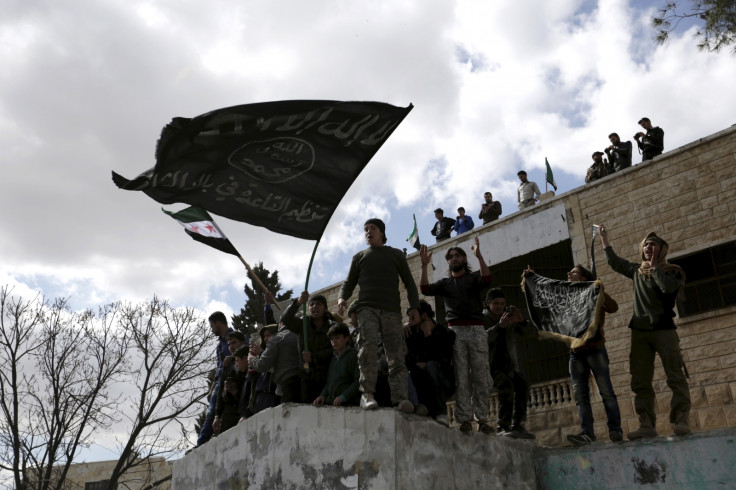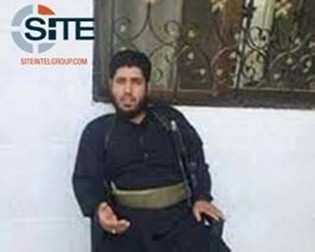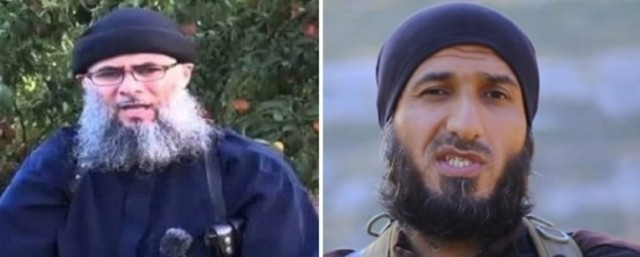Disarray in the Syrian Jihad is making conditions perfect for an Al-Qaeda resurgence
The organization has not at all given up on Syria, but is rather trying to reestablish itself.

Al-Qaeda (AQ) found itself on the losing end of a years-long investment in July of 2016 when Nusra Front (NF) leader Abu Muhammad al-Julani announced the group's leave from AQ to become Jabhat Fateh al-Sham (JFS), thus breaking his pledge to AQ leader Ayman al-Zawahiri. Julani, the man who ignited a bloody conflict with the Islamic State (IS) after abandoning Abu Bakr al-Baghdadi to establish a new AQ affiliate in Syria, had ironically removed AQ's formal presence in the country altogether.
But stress the word formal in "formal presence," because AQ planted its Syrian foundation much deeper than Julani and others may have anticipated.
A steady stream of Syria-focused rhetoric from AQ shows that the organization has not at all given up on Syria, but is rather trying to reestablish itself.
Meanwhile, ongoing politicking and inter-faction quarrels since then have created a steadily widening crack in Syria's jihadist movement, making very fitting conditions for AQ to do exactly that.
Syrian Jihad in Disarray
Mergers and rebranding amongst Syria-based factions have been a regular element of the Syria Civil War. But when Julani announced NF's split, AQ veterans (who were also NF founders and leaders) responded with their own resignations one by one.
Among these individuals were members of what U.S. officials once dubbed the "Khurasan Group," referring to AQ operatives sent to Syria from the Afghanistan-Pakistan region at the start of Syrian Civil War. Their very names and histories were recruitment devices in themselves, and contributed significantly to NF's strength and support in Syria and abroad.

One to resign was Jordanian Iyad al-Tubasi (AKA Abu Julaybib), a founding NF member who stated his "complete and categorical rejection" of its departure when announcing his leave that following month.
In the message, Abu Julaybib restated his pledge of allegiance to Zawahiri while swearing to "move forth in waging jihad in the cause of Allah until I die."
Abu Julaybib's resignation carried a lot of weight. With almost 20 years of jihad under his belt, Abu Julaybib has fought in Afghanistan, and also alongside Abu Musab al-Zarqawi under al-Qaeda in Iraq (AQI), IS' predecessor. He was also a founding member of NF, serving as a leader in Dara'a and then in the Lattakia countryside, with hundreds of fighters loyal to him.
Also to resign upon NF's split from AQ was Abu Hammam al-Shami (Farouq al-Suri), a high-profile NF commander who wrote in a hand-written letter addressed to Julani and distributed on social media:
I have decided to tell you that I have left the work under your command and your group, the Nusra Front—and I say Nusra Front because I never and will not be in the new formation, Jabhat Fateh al-Sham...
Like Abu Julaybib, Abu Hammam's resignation was a heavy one. He started his path in jihad in the late 90s, joining AQ training camps in Afghanistan, pledging to Bin Laden, and training under FBI Most-Wanted target Saif al-Adl.
In 2001, following the US invasion in Afghanistan, Abu Hammam was sent to Iraq, where he worked with Zarqawi to create the foundations of Iraq's organized jihadist movement. He would eventually return to Afghanistan, only to be ordered by AQ ideologue Attiya Allah to Syria, where he helped found NF.

Among others to resign were Bilal Khreisat (AKA Abu Khadija al-Urdni), a long-serving security and Shariah official, and Sami Mahmoud (Sami al-Uraydi), head of NF's Shariah department.
Acknowledging these resignations from JFS, AQ supporters even acknowledged the following October that "great leaders" have left JFS for various reasons, one of them being that "JFS hasn't put Al Qaeda leaders in charge of the organization."
In a series of questions and answers posted to a pro-AQ Telegram channel that November, one question asked if it was "time for a new group" in Syria, to which the channel answered in part:
We spoke to many brothers from different groups with jihad experience and they say that Al Qaeda is the only group that is able to instill fear to the enemy and to defeat them.
Though maintaining loyalty as the current head of Hayat Tahrir al-Sham (HTS), a group merged from JFS and other factions, Julani has earned a significant amount of distrust across the rebel community—and not for no reason. The leader has earned reputation for arresting or attacking those who oppose him, including such respected AQ-associated figures.
HTS has furthermore been in a constant state of tension with former NF/HTS-ally Ahrar al-Sham, and this past July, the rebel-aligned Shura Council of Scholars in Sham even called Julani, then-HTS military commander, a "war criminal."

AQ's Persisting Focus on Syria
AQ, despite losing its regional affiliate in Syria, has nonetheless shown consistent interest in the region. Following the split from NF, Zawahiri and AQ have dedicated a large portion of media releases to the Syrian jihad, with six dedicated wholly to the country (three leadership speeches and three out of AQ Central's five statements), and at least ten indirectly addressing the country or Muslim fighters therein. No other country has received so much attention from the organization.
In one Syrian jihad-focused speech this past April, Zawahiri laid out a vision for Syria's direction. Entitled, "Shaam Will Submit to None Except Allah," the speech was Zawahiri's first Syria-focused message since NF's split nine months prior. Zawahiri made a pretty clear jab at Julani and his new methodology, calling it that of "Abu Righal" (an Islamic historical figure characterized as a traitor for allowing enemy forces into Mecca):
Our brothers in Shaam: Watch out for the progeny of Abu Righal, who wish to deceive you into buying the myth that only if you were to change your Jihad to an exclusively nationalist Syrian struggle, the leading international criminals would be pleased with you, for this goes against what the Quran has clearly explained: "Never will the Jews, nor the Christians be pleased with you, until you follow their creed." [Al-Baqarah: 120]
After, Zawahiri urged fighters to reject nationalist sentiment and wage a protracted guerrilla war against the Syrian regime. He then called on Muslims the world over to support their brethren in Syria.
Even when mourning slain "martyrs" from the Pakistani army's military campaign in North Waziristan in August 2017, Zawahiri shifted his speech and took a moment to again offer advice to Muslim fighters in Syria. He encouraged them to "have foresight" to "rescue the Jihad," and candidly warned against infighting among Muslim fighters.
Other speeches from Zawahiri have discussed jihad in Syria more generally, or invoke it in an appeal to take up arms. For example, his June 9 address, "One Ummah, One War on Multiple Fronts," promoted unity among Muslims everywhere and included Syria.
More recently, on October 4, Zawahiri called for consolidating ranks against the US and "client regime" using the bombings in Syria as enticement in his speech, "We Shall Fight You until There Is No More Persecution."
AQ's attention to Syria has not been limited to Zawahiri. AQ Central's three Syria-related statements, most often attributed to its "General Command," have attempted to capitalize on recent events in Syria.
They were: a eulogy for Zawahiri's deputy in Syria on March 5, 2017, an incitement for Muslims to take revenge against America for Aleppo airstrikes on March 17, 2017, and a call for HTS and Ahrar al-Sham to halt infighting.
Hamza bin Laden: "Your help for [Syrians] is the oxygen which they cannot do without...Your participation in the Jihad of al-Sham [Syria] will be a source of blessing for you."
The most telling release, though, was issued by AQ's as-Sahab Media Foundation on September 14 as a 12-minute audio speech by Hamza bin Laden, a son of Usamah bin Laden and a rising voice for the global jihadi movement.
In the speech, entitled, "The Cause of al-Sham [Syria] is the Cause of Islam," Bin Laden's son praised his "beloved Mujahid brothers" in Syria and urged for unity among them, though notably not naming any specific groups. He then made a mobilization call to Muslims around the world:
Your help for [Syrians] is the oxygen which they cannot do without, and your setting out to join them is the nourishment without which they cannot survive...so do not cut off this supply of oxygen and nourishment. Your participation in the Jihad of al-Sham [Syria] will be a source of blessing for you. Everything in Jihad in al-Sham assumes a heavenly dimension.
Suddenly, and perhaps not unconnectedly, a new group was formed in Syria.
Ansar al-Furqan: AQ's New Front in Syria?
So what happens when you leave a score of dissatisfied, unemployed AQ veterans just sitting in a region of equally dissatisfied jihadi fighters? Since the NF-AQ split, rumors have come and gone of possible new factions formed under these figures. This past December, Abu Julaybib was reported to have started his own faction, dubbed by some as "Taliban of Syria."
However, the idea of a new hardline faction surpassed chatter and rumors when a group calling itself "Ansar al-Furqan" announced its establishment in a nine-page message posted to Twitter on October 9, 2017.
Ansar al-Furqan introduced itself while projecting both seniority and bitterness at the state of affairs on the ground:
[Ansar al-Furqan] is Sunni jihadi Muslims, consisting of immigrants and local supporters who attended most of the Syrian events in their beginnings and witnessed most of what has become of the groups. Thus they discovered that the secret of the issue and the reason behind the deficiency was due to becoming distant from the evident verses [Qur'an] and not adhering to it or abiding by it, and using the brain superficially and not giving in to following the pure test [Qur'an] in many issues.
Despite its punchy self-introduction, the group, reportedly housed in Idlib, has been shrouded in mystery, not naming a single member of its leadership in the statement. This lack of details has left jihadi supporters asking questions, and leaders strangely silent.

Many suspect that the group is run by high-profile NF/JFS-defecting AQ vets like the aforementioned Abu Khadija and Abu Julaybib. Some have even speculated that Hamza bin Laden may be running the group, with others going as far to report that he may be doing so from inside Syria, though such a prospect seems far-fetched.
But should Hamza bin Laden have any sort of command or hand in Ansar al-Furqan, it could have profound implications for the Syrian jihad.
Hamza in Laden is a widely respected figure among jihadists for both the acts of his father and his carefully constructed rhetoric, notably not wading into the AQ-ISIS conflict upon his resurfacing. Instead, his messages have always urged for jihadi unity and widely accepted goals of the movement (namely, attacking "Crusaders," Jews, and others while urging to avenge his father's death).
Hamza's entrance on the Syria scene would be well-timed to the steady demise of ISIS, which has been kicked out Mosul, its de facto capital in Iraq, and is on its way out of Raqqah, its de facto capital in Syria.
These mounting losses have made ISIS, a group already sharply isolated from and opposed to other jihadi factions, all the more unappealing to many jihadi hardliners already critical of it—thus giving someone like Hamza a large share of the hardliner recruitment market.
Once more, it appears Julani is making a move to alienate himself from those who once supported him.
These variables beg the question: if Hamza bin Laden is behind Ansar al-Furqan—or any other faction in Syria, for that matter—would Julani dare to go against him? Hamza's name would surely create a giant leak in HTS of hardliners defecting to his organization.
We may already be seeing the first signs of such a power struggle between Ansar al-Furqan and Julani/HTS. Just days after Ansar al-Furqan's establishment, pro-AQ Telegram channels began reporting of an HTS "security campaign" against the group, and that "HTS once again, gives the green light to its security people to arrest Abu Julaybib, Abu Hajer and Abu Khadija."
Once more, it appears Julani is making a move to alienate himself from those who once supported him. As one post stated amid reports of the "security campaign": "Julani is following in [ISIS leader] Baghdadi's footsteps."
The extent to which Ansar al-Furqan may or may not be linked to Hamza bin Laden and AQ is in some ways beside the real point at hand. Its very establishment and mission statement in themselves expose a long-developing and problematic space in Syria for AQ's ideology.
Pressure from the international community indeed helped to push Zawahiri's leadership out of Syria, but the demand for AQ's leadership among hardliners never went anywhere. And as these highly experienced AQ veterans still sit in Syria, situated within masses of frustrated jihadists and a growing void of hardliner leadership, only a fool would think that AQ is sitting idly by.
Rita Katz is executive director of the SITE intelligence group (www.siteintelgroup.com). She has been monitoring terrorist activity and Jihad for more than a decade.
© Copyright IBTimes 2025. All rights reserved.






















